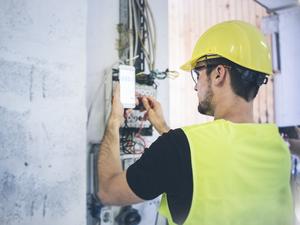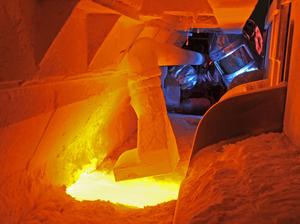
A Phoenix-based company is developing cannabis detection technology similar to an alcohol breathalyzer to improve safety and boost testing accuracy.
ElectraTect Inc. is in the research and development phase of creating a sensor that can detect recent consumption of tetrahydrocannabinol, or THC, the substance responsible for marijuana’s psychoactive effects.
“This sensor basically works the same way an alcohol breathalyzer sensor works, only we've tailored the materials to be sensitive to THC instead of ethanol,” ElectraTect co-founder Evan Darzi, said. “That was a huge breakthrough for us and now we're basically marching toward building a prototype that can be used in validation studies with human breath.”
ElectraTect raised $1.4 million in 2021 from Des Moines, Iowa-based ignition interlock device company Intoxalock to develop the sensor that could eventually be used in a portable THC breathalyzer, which the company is also planning to create.
“We're really excited about our partnership with Intoxalock. It leads to a pretty logical first product being one of the ignition interlock devices,” Darzi said. “By having these ignition interlock devices, it allows people to basically maintain some normal semblance of their life. They can still take their kids to school, go to work, while still trying to help get them on the right track, so they're not driving impaired.”
Darzi, a Valley native and Arizona State University graduate, founded ElectraTect in 2020 with Neil Garg, a synthetic chemist and University of California, Los Angeles professor. The company is a spin-out of a UCLA invention and study related to THC detection.
Darzi, who was a postdoctoral fellow at UCLA, recalls that Garg’s lectures explaining how chemistry led to invention of the alcohol breathalyzer sparked the initial conversation about a similar device to detect THC.
“Interestingly, during one of those sessions, someone in the crowd came up and asked, ‘Hey, why don't we have a marijuana breathalyzer yet?’,” Darzi said. “In California, at that point, marijuana had been legal for maybe a year or two. But there is no comparable marijuana tool.”
Garg posed that question to the UCLA research group of which Darzi was a member.
“I kind of have an interdisciplinary background, where I've worked a lot, not only in synthetic chemistry, but a little bit in engineering and electronics with my Ph.D. work,” Darzi said. “We really dug into it and we were kind of shocked to see that there's very little to no research in this area over the past several decades.”
ElectraTect device required new research to create
The group obtained a federal Drug Enforcement Administration license to conduct research, Darzi added.
“We were really fortunate within about, I'd say, a month of working with THC directly we were able to develop some pretty cool fundamental chemistry that could be used to develop a marijuana breathalyzer one day,” Darzi said. “We put in a patent for that and submitted a peer review publication to basically half the community to validate the idea was at least somewhat sound.”
Darzi received a call from the UCLA Technology Development Group, which told him the research group's provisional patent for THC detection had generated significant interest. The UCLA Technology Development Group assists with researching and patenting ideas.
“From there, we did our due diligence and thought, ‘Maybe we can start a company to further develop this technology,’” Darzi said.
In 2021, ElectraTect moved into the 850 PBC building in the Phoenix Bioscience Core in downtown Phoenix.
The industry standard for marijuana testing is either taking a blood, urine or saliva sample, all of which are unable to detect a person's current and actual level of impairment from THC. Because of that, ElectraTect is aiming to bring fairness to testing by creating a device that shows current impairment from THC rather than traces in a person's system from weeks ago, he added.
A third-party group of researchers conducted a clinical trial indicating THC was detected on peoples’ breath for about four hours after use and that further prompted a desire for ElectraTect to develop cannabis detection technology.
"It nicely tracks with the time window that somebody would be impaired," Darzi said. “So we were really excited by this.”
Darzi sees potential for ElectraTect's THC detection technology to be used in law enforcement and workplace safety situations.
“I think that's a really important market. We don't want to be firing people or denying people the right to work because they legally used marijuana a week ago,” he said. “So that's something that we care about.”
Darzi aims to commercialize ElectraTect’s sensor and THC breathalyzer is about two to three years.
ElectraTect, which has seven employees, has raised nearly $5 million in capital to date, Darzi said.
“All of this is fundamental research, but we are definitely interested in pursuing a series A round of funding in the near future,” Darzi said. “So, that's something that we kind of have some feelers out for now.”











